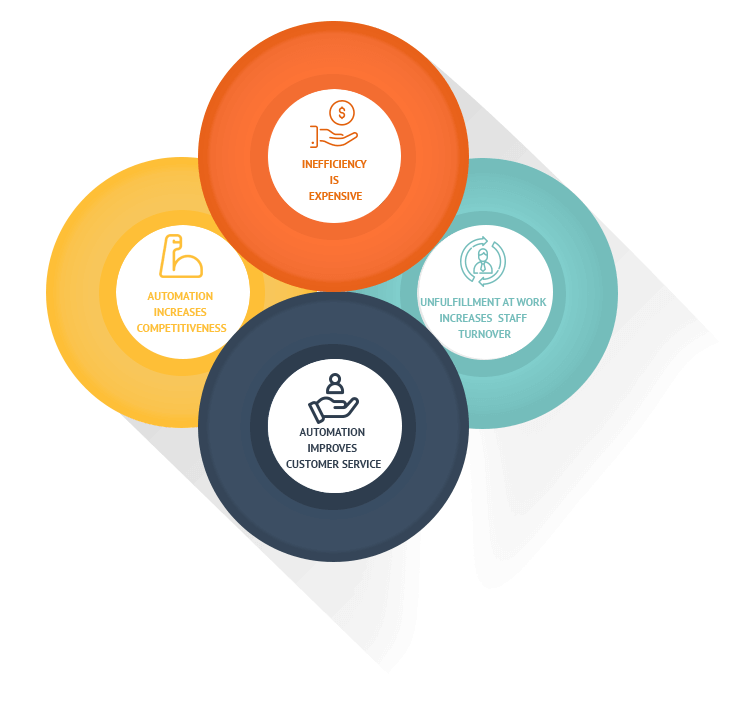You probably already know how important it is to innovate and stay ahead of the crowd in business. But it can be difficult to know when to automate, and how long you can afford to wait before other businesses in your industry gain a competitive edge.
Automation is becoming more important at every level of business. For small firms, automation can help make up for the fact that they lack the teams of IT gurus, contractors, and developers that huge corporations make use of. For large firms, automation increases flexibility, allowing them to quickly react to changes in their marketplace. By automating your business processes, you can make it easier to operate nationally or worldwide, regardless of your size or resources.
If you’ve been putting automation plans on the backburner, here are some ways the cost of inaction can be higher than the expenses associated with automation:

Inefficiency is Expensive
When tasks are completed manually, errors are inevitable. You may have a dedicated, experienced person doing these tasks, and the results may be cross-checked, but mistakes will still happen.
Not to mention, manually entering data, updating records, and performing other low-value tasks is resource-intensive and time-consuming. While an employee may spend days painstakingly compiling a report, that same report could be completed in just seconds with automated technology. When you consider how much you’ll pay in wages and salary for employees to do this type of work, it’s easy to see how it can be more expensive to not automate.
Unfulfillment at Work Increases Staff Turnover
Staff turnover happens naturally. But you can expect your churn rate to be higher if your employees are not feeling fulfilled at work. Boring, time-consuming tasks like data entry lead to frustration amongst employees who need to feel like their work is contributing to the bigger picture.
Hiring, onboarding, and training new employees is expensive. In Australia, the cost of turnover is estimated at $3.8 billion in lost productivity each year. An additional $385 million is spent on recruitment costs to replace those employees. According to PwC, each employee’s turnover cost is up to 2.5 times that employee’s annual salary. By investing in automation and reducing the number of mind-numbing tasks your employees have to do each day, you can give them interesting, meaningful work. This will increase job satisfaction and reduce the likelihood that employees will leave your company.
Automation Improves Customer Service
Without customers or clients, you have no business. That’s why every business decision should be made with your customers in mind. Automation reduces friction for your clients, who don’t want to deal with long wait times just to talk to someone from your company.
Automating your customer service can also allow you to remove the issues that cause customer dissatisfaction in the first place. Voice recognition, call recording, and usage monitoring, combined with usage analytics can help you understand how customers are interacting with your sales and marketing teams, and the issues they’re likely to face.
Without automation, the best way to improve customer service is often to hire more customer service representatives. Automation can help you delight your customers without the added expense of hiring and onboarding new team members.
Automation Increases Competitiveness
The concept ‘innovate or die’ has never been more relevant. Customers have more choice than ever before and can interact with the brands they like in a variety of different ways.
A growing wealth of data is finding that consumers are becoming more impatient and demanding, as the power shifts from businesses to customers. These new expectations around the standards of customer service and customer experience are making it crucial that businesses innovate, incorporating automation in a way that pleases and delights both potential and current customers.
Failure to automate at the right time will almost guarantee that you’ll lose market share to your competitors.
If you’re planning to implement automation but you’re not sure where to get started, get in touch with Intergy today.




